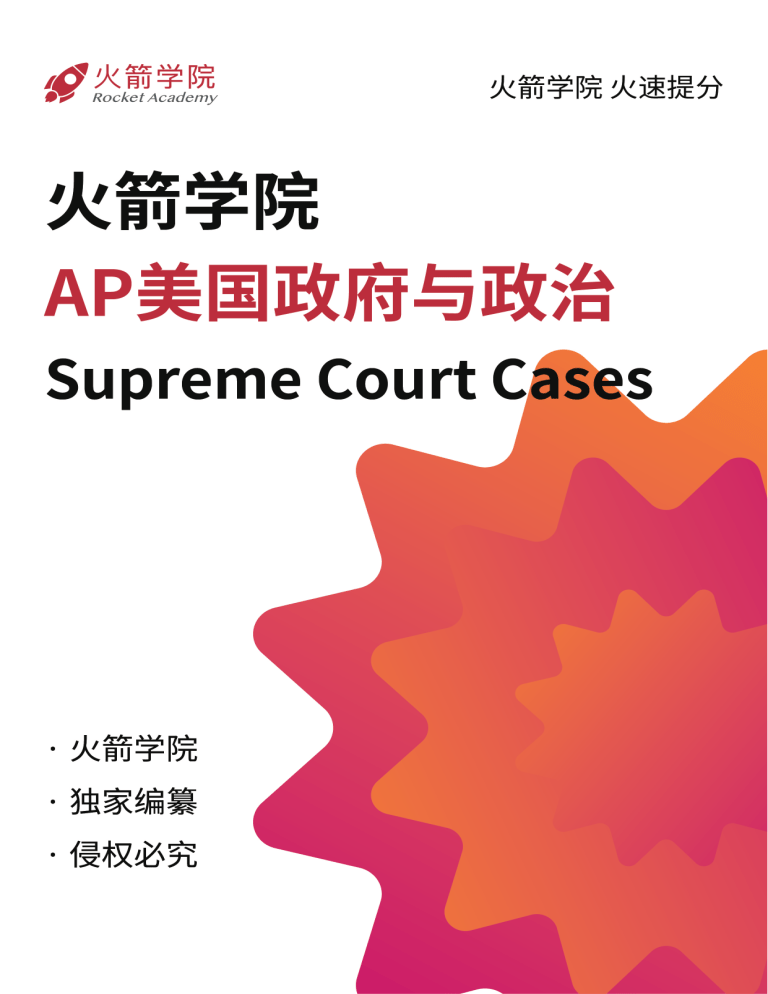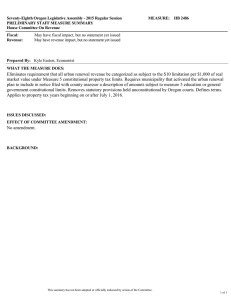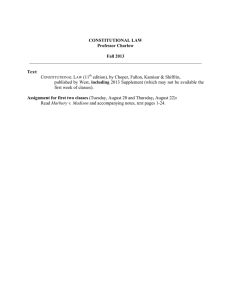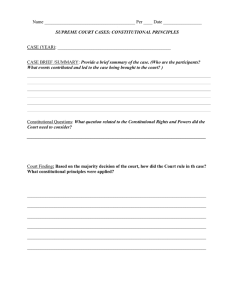
⽕箭学院 ⽕速提分 AP U.S. GOV REQUIRED SUPREME COURT CASES McCulloch v. Maryland (1819) Facts: Several states, including Maryland, passed laws to tax the Bank of the United States Holding 1. Congress may establish a national bank 2. States may NOT tax the national government Constitutional Principle 1. As a result of the necessary and proper clause, Congress has implied powers and is not limited by its expressed powers 2. The supremacy clause asserts that the national government is superior to state governments when the two conflict United States v. Lopez (1995) Facts: A student in Texas brought an unloaded gun to school and was charged with violating the federal Gun-Free School Zone Act of 1990 Holding The law is unconstitutional because possession of a gun in a school zone does not substantially affect any sort of interstate commerce Constitutional Principle The 10th Amendment creates a federal system that protects state power. The commerce clause does NOT grant Congress endless power. Engel v. Vitale (1962) Facts: Public schools in New York began the school day by inviting students to recite a nondenominational prayer each morning Holding States cannot hold prayers in public schools, even if participation is voluntary and the prayer isn’t tied to a specific religion Constitutional Principle State-sponsored prayer in public violates the 1st Amendment, establishment clause. Through the 14th Amendment and incorporation, both states and the federal government are prohibited from officially backing religious activities. Wisconsin v. Yoder (1972) Facts: Wisconsin had a law that mandated school attendance until age 16. Amish families refused for religious reasons to send their children to high school once they finished 8th grade. Holding Compelling Amish students to attend public school beyond 8th grade violates the 1st Amendment, free exercise clause Constitutional Principle Individuals’ interest in free exercise of religion outweighs the state’s interest in compelling school attendance beyond 8th grade Tinker v. Des Moines (1969) Facts: Students were suspended for wearing black armbands as a symbol to protest the Vietnam War. Holding The armbands represent pure speech and students have free speech rights at school. To justify suppressing speech, the school must prove that it would substantially interferer with the operation of the school Constitutional Principle The students’ right of political, symbolic speech based on the 1st Amendment’s free speech clause overrode the school administrators’ concern for potential disorder. ⽕箭学院 ⽕速提分 New York Times v. United States (1971) Facts: The Nixon administration attempted to stop the publication of the Pentagon Papers, a classified study of U.S. activities in Vietnam, by the New York Times and Washington Post Holding The government did not have the right to block publication of the Pentagon Papers Constitutional Principle Because of the 1st Amendment’s freedom of press, there is a heavy presumption against the constitutional validity of government claims of prior restraint Schenck v. United States (1919) Facts: Charles Schenck, a socialist, distributed leaflets arguing that the military draft violated the 13th Amendment. He was arrested for violating the Espionage Act by attempting to cause insubordinates in the military and obstruct recruitment. Holding The Espionage Act did not violate the 1st Amendment and was an appropriate exercise of Congress’ wartime authority Constitutional Principle The First Amendment’s free speech guarantee does NOT shield advocacy urging unlawful conduct or speech that creates a clear and present danger. Gideon v. Wainwright (1963) Facts: Clarence Earl Gideon was charged with a felony and requested that the state court appoint a lawyer for him. The court denied his request because according to Florida state law, attorneys would only be appointed for a person in a capital case Holding States must provide attorneys for defendants who can't afford one. (Incorporated the right to an attorney) Constitutional Principle The 6th Amendment’s guarantee to the right of counsel applied to defendants in state court by way of the Fourteenth Amendment Roe v. Wade (1973) Facts: A Texas state law prohibited abortions except to save the pregnant woman’s life Holding A woman has a right to an abortion based on the right to privacy Constitutional Principle A woman’s right to an abortion is within the right to privacy as recognized in Griswold v. Connecticut and incorporated through the 14th Amendment McDonald v. Chicago (2010) Facts: Residents of Chicago were invariably denied licenses for handguns, creating an effective ban on handguns. D.C. v. Heller(2008) established an individual right to bear arms. Holding The 2nd Amendment’s right to bear arms for the purpose of self-defense applies to the states. (Incorporated the right to bear arms) Constitutional Principle The 2nd Amendment establishes an individual right to bear arm; through the 14th Amendment’s due process clause applies to states Brown v. Board of Education (1954) Facts: Black students in several states were denied admittance to certain public schools based on race Holding Racial segregation of public schools allowed by “separate but equal” principle of Plessy v. Fergusonis unconstitutional Constitutional Principle Racially segregated schools violate the equal protection clause ofthe 14thAmendment Impact: Required the desegregation of public schools; states were very slow to abide ⽕箭学院 ⽕速提分 Citizens United v. Federal Election Commission (2010) Facts: BCRA banned corporations and unions from independent political spending within 60 days of a general election or 30 days of a primary election. BCRA also banned direct contributions from corporations to candidate campaigns or political parties. During the 2008 primaries, Citizens United, a conservative nonprofit organization, was prevented by the F.E.C. from showing its anti-Hillary movie, Hillary: The Movie. Holding Corporations are people, therefore corporate funding of independent political expenditures cannot be limited. 1. Corporations, unions, and interest groups can raise and spend unlimited amounts of money in the form of independent expenditures. 2. Led directly to the formation of IndependentExpenditure-Only Committees, aka Super PACs. 3. Struck down parts of BCRA, including the ban on soft money and limitations on timing of political ads. Constitutional Principle Based on the First Amendment’s free speech clause, corporations have the right to engage in political speech. Baker v. Carr (1962) Facts: Tennessee residents alleged that reapportionment didn’t take into account population shifts, therefore one person’s vote wasn’t necessarily equal to another person’s vote. Holding Apportionment claims are justiciable in federal court. Constitutional Principle Under the equal protection clause the appellants had a right to challenge unequal apportionment. Impact: Led to “one person, one vote” principle that increased democracy and voting rights of minorities Shaw v. Reno (1993) Facts: North Carolina created a very bizarrely shaped majority-minority district for the purpose of increasing black representation in Congress. Holding Congressional districts cannot be drawn based only on race. Constitutional Principle Drawing a congressional district based only on race violated the equal protection clause and opposes the “colorblind” ideal of U.S. law Marbury v. Madison (1803) Facts: William Marbury was appointed as Justice of the Peace in D.C. by Adams but didn’t receive his commission, so he petitioned the Supreme Court to compel the Secretary of State, James Madison, to deliver his commission. Holding Marbury was entitled to his commission, however, the Court was unable to grant it because the relevant portion of the Judiciary Act of 1789 conflicted with the Constitution and was therefore null and void. Constitutional Principle Marbury was entitled to his commission, however, the Court was unable to grant it because the relevant portion of the Judiciary Act of 1789 conflicted with the Constitution and was therefore null and void. Impact: Established judicial review: the power to declare a law unconstitutional. This greatly strengthened the judiciary. ⽕箭学院 ⽕速提分



